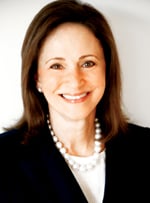Holding a Mirror to the Profession

Carolyn Lamm
Photo by Ak Vogel
The world has changed. in law school, I was one of only 10 women in my class. When I began practicing, nearly all of my colleagues and all of the judges were white men. Women had to work especially hard just to be accepted and advance their careers. Although our profession today is much more diverse and inclusive, obstacles to free and equal professional success remain and impose the proverbial “glass ceiling.”
While women make up just over half of the U.S. population and half of the entering classes in law schools, they represent one-third of the lawyer population, and their representation as general counsel, equity partners and judges lags behind. Racial and ethnic minorities make up approximately one-third of the U.S. population, but they represent only 10 percent of the lawyer population and fewer than 16 percent of all judges.
Only 18 percent of law firm partners are women, and only 6 percent are racial or ethnic minorities. Among Fortune 500 general counsel, only 18 percent are women and only 7 percent are racial or ethnic minorities.
These numbers do not nearly reflect the diverse range of talent in our profession. Our lack of diversity runs counter to the promise of fairness and equality that is our profession’s bedrock, depriving the community of a bench that reflects the population and of legal advice that is a product of diverse views. Indeed, our failure to ensure equal opportunity may raise questions about the fairness of our judicial system and the quality of justice.
FOSTERING INCLUSIVENESS
Nearly all entities throughout the ABA work to foster greater diversity in the legal profession. They are promoted by the ABA’s three Diversity Center entities: the Commission on Racial and Ethnic Diversity in the Profession, the Council on Racial and Ethnic Justice, and the Presidential Advisory Council on Diversity. In addition, the Commission on Women in the Profession works to secure the full and equal participation of women in the ABA, the legal profession and the justice system. The Commission on Mental and Physical Disability Law addresses disability-related public policy, disability law, and the professional needs of lawyers and law students with disabilities. And the Commission on Sexual Orientation and Gender Identity seeks to secure full and equal access to and participation in the ABA, the legal profession and the justice system for lesbian, gay, bisexual and transgender people.
We must continue to address pipeline issues and ensure that all people who are underrepresented in our profession have opportunities to attain leadership positions. We must redouble our efforts to ensure confidence in the fairness of our profession and justice system.
I have appointed a Presidential Commission on Diversity, chaired by Judge Ellen Rosenblum. It is working with the ABA to provide practical resources and guidance for lawyers to help shatter the glass ceiling.
Central to the commission’s efforts is a series of distance-learning CLE programs to help underrepresented lawyers advance their legal careers. The following programs are currently or will soon be available for viewing at the ABA Web Store, ababooks.org:
• Removing Bias from Attorney Evaluations focuses on how fair evaluations help ensure opportunities for associates to work on complex matters for important clients, to improve their skills, to increase their referral base, and to achieve a high level of professional satisfaction.
• Smart Soloing: Success Strategies for Diverse Lawyers (available Feb. 5) helps recent solo/small-firm lawyers build the skills and confidence needed to operate a successful law practice. Topics include: how to run an office and market a practice, how to obtain good guidance and mentoring, and how to identify and solve ethical dilemmas to avoid disciplinary action.
• What Law School Didn’t Teach You: Self-Advocacy for Survival and Sustainability (available April 29) identifies unique and diverse talents—beyond knowing how to put together a business transaction or prepare a will or trust—that make successful lawyers.
This month, at the ABA Midyear Meeting in Orlando, Fla., the Presidential Diversity Commission will unveil Diversity in the Legal Profession: Next Steps, the final report and recommendations from last year’s diversity hearings and summit convened by former ABA President Tommy Wells. The commission will solicit audience feedback for a candid examination of the next steps for racial and ethnic, gender, sexual orientation, and disability diversity in the legal profession.
Building a more diverse profession is not a quick-fix, short-term goal. It is an ongoing campaign, one in which the ABA has been engaged for decades. We are committed to seeing a Supreme Court that reflects our population and a profession in which all lawyers—no matter their gender, racial or ethnic background, sexual orientation or disability—have the opportunity to achieve all of which they are capable.



